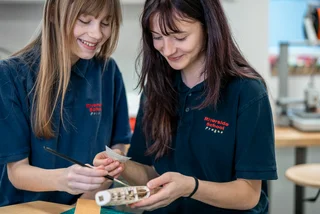Xiaojing comes from China. Maria is from Mexico. Ahmad was born in Kuwait. Katrine is Danish. Masami´s childhood was spent in Japan. Pavel is from Prague, Czech Republic.
While these students come from many different linguistic and cultural backgrounds, they are united by one very important goal: to learn English to be successful at the International School of Prague, and they are not alone. Approximately 65% of students enrolled at ISP do not speak English as their mother tongue or first language. Many of these students come to ISP in need of English language support. To that end, ISP has developed a comprehensive and dynamic program for English language education, a program solely dedicated to meeting the needs of the limited English proficiency speakers in our academic environment, as stated in the program´s mission: As a program committed to excellence in English language education, the Program of Teaching English to Speakers of Other Languages will facilitate the linguistic, academic, and social success of each limited English proficiency student while striving to respect the integrity of each student’s cultural identity and promoting the use of the mother tongue.
PARTNER ARTICLE
Upon arrival to ISP, non-native English speaking students undergo a comprehensive evaluation to determine their level of English language proficiency. Thereafter, they are placed into appropriate classes based on immersion methodology theory. This means that students of limited English attend carefully selected subject-area classes and then receive appropriately selected English language support, both inside and outside of the classroom, based on their individual needs in relationship to the subject-area objectives. As students gain more mastery of English, as demonstrated in classroom achievement, they become more independent of the program´s services. While there are many challenges in an immersion environment, the overall benefits are clear: students learn English better and have greater self-esteem when included — and properly supported — in subject-area classes with their more-fluent speaking peers.
As students go through the immersion program, it is common for them and their parents to ask, “Just how long will it take to learn English?” This is an important and profound question, and the answer is not so simple. First, it is necessary to consider the complex nature of English itself — or any other language. In simple, language is made up of a myriad of factors, all of which, taken together, affect meaning and communication. Briefly stated, we could say that the nature of language is dynamic combination of many parts, to list a few: sociolinguistics, semantics, pragmatics, phonology, grammar, syntax, morphology, and phonetics. I think one can see the point: “English” is not so simple; therefore, learning it may take some time.
Over the past years, researchers have tried to quantify the number of years it takes to learn English in institutions very much like ISP. In order to do so, they have decided to divide English in to two types or purposes: social and academic. Social English could be defined as the English used for personal expression and enjoyment in social situations. Academic English, on the other hand, is the requisite English needed to understand and communicate subject matter in a school setting. The research has shown, as we have seen here, that for a student coming to a program, such as our at ISP, with a beginning-level of English language ability, it will take her between three to five years to learn social English and five to seven years to learn English for academic purposes. Of course, each individual student´s rate of learning English does vary within these time frames based on a variety of fundamental factors, such as age, personality, aptitude, attitude toward target language speakers and culture, first-language and culture transfer, and the impact of the home and school environments, among many others. By carefully considering these factors for each of our students, we are able to build effective language learning environments which help to increase the efficiency and quality of their language learning experience at ISP.
Students like Xiaojing, Maria, Ahmad, Katrine,Masami and Pavel will tell you the process of learning English has been a long and sometimes difficult one — and they should know. They will also tell you that it has been worthwhile because they have used English as a vehicle to learn more about the world, their place therein, and to build important friendships. Their success is in part due to supportive peers, teachers, and parents, but it is also a credit to each student´s effort and fortitude, key components of language learning.
The individual’s whole experience is built upon the plan of his language
—Henri Delacroix












 Reading time: 3 minutes
Reading time: 3 minutes 
















